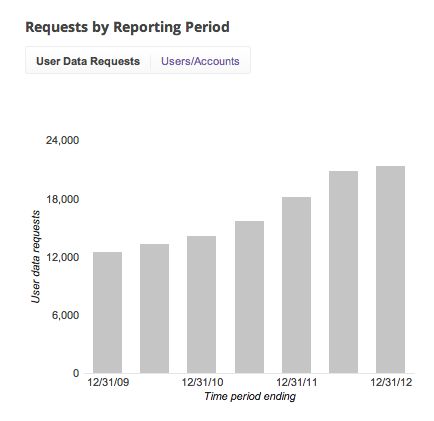Google: Uncle Sam Personal Data Requests Up 136 Percent

In response to growing concern over the privacy of personal information online, companies such as Facebook, Twitter, Google, and Microsoft have revealed the number of personal data requests received from government entities worldwide.
While conditions such as time period and location vary, one uniform trend is confirmed: Government requests for personal data are at an all-time high.
Facebook, for example, received between 9,000 and 10,000 user-data requests covering between 18,000 and 19,000 accounts from any and all government entities in the United States, Facebook General Counsel, Ted Ullyot, reports in a June press release.
The requests, which covers a six-month period ending December 31, 2012, range "from things like a local sheriff trying to find a missing child, to a federal marshal tracking a fugitive, to a police department investigating an assault, to a national security official investigating a terrorist threat."
For the first time ever, the company was granted permission to publish a transparency report on all U.S. national security-related requests and while they are still only authorized to communicate these numbers in aggregate, the company will "continue to push all governments to be as transparent as possible."
Should Facebook have the right to report these requests in more detail? Give your opinion by leaving a comment now!
This sentiment is echoed in Twitter's commitment to "the open exchange of information." Its third biannual transparency report revealed 1,157 information requests in the first half of 2013.
In the United States alone, the number of government requests for user information submitted to Twitter has jumped from 679 to 902 - an increase of 33 percent.
For Microsoft, subpoenas and orders from U.S. governmental officials affected between 31,000 and 32,000 consumer accounts, with the company flooded with somewhere between 6,000 and 7,000 criminal and national security warrants in the latter half of 2012.
Google, however, tops the list, with 21,389 personal data requests received from governments between July and December of 2012 - 8,438 from the United States alone.
"User data requests of all kinds have increased by more than 70% since 2009," Richard Salgado, legal director at Google said in a blogpost.
Google reports. "In total, we received 21,389 requests for information about 33,634 users from July through December 2012,"
"In total, we received 21,389 requests for information about 33,634 users from July through December 2012,"
In the United States, user information requests have increased by 136 percent since 2009, with Google complying to some degree in 90 percent of the cases.
While these numbers are concerning, it is the first time since Google's inception that the company has disclosed the legal processes used by US government agencies to gather electronic information.
The findings: 68 percent of information requests received by Google were subpoenas under the Electronic Communications Privacy Act (ECPA), 22 percent were through ECPA search warrants, and 10 percent were ECPA court orders.
As government requests for user-data continue to rise, Internet companies are sending an important message to governments worldwide: If the government has the authority to ask for our personal data online, Internet companies have the right to report it.
"Transparency alone may not be enough to restore public confidence, but it’s a great place to start," Vice President of Microsoft, John Frank, writes.
Whether or not calls for transparency will result in the protection of our information online remains to be seen, with continued scrutiny placed on both governments and Internet companies alike.
Do you feel like your information online is compromised?
Photo Credit: The Verge



